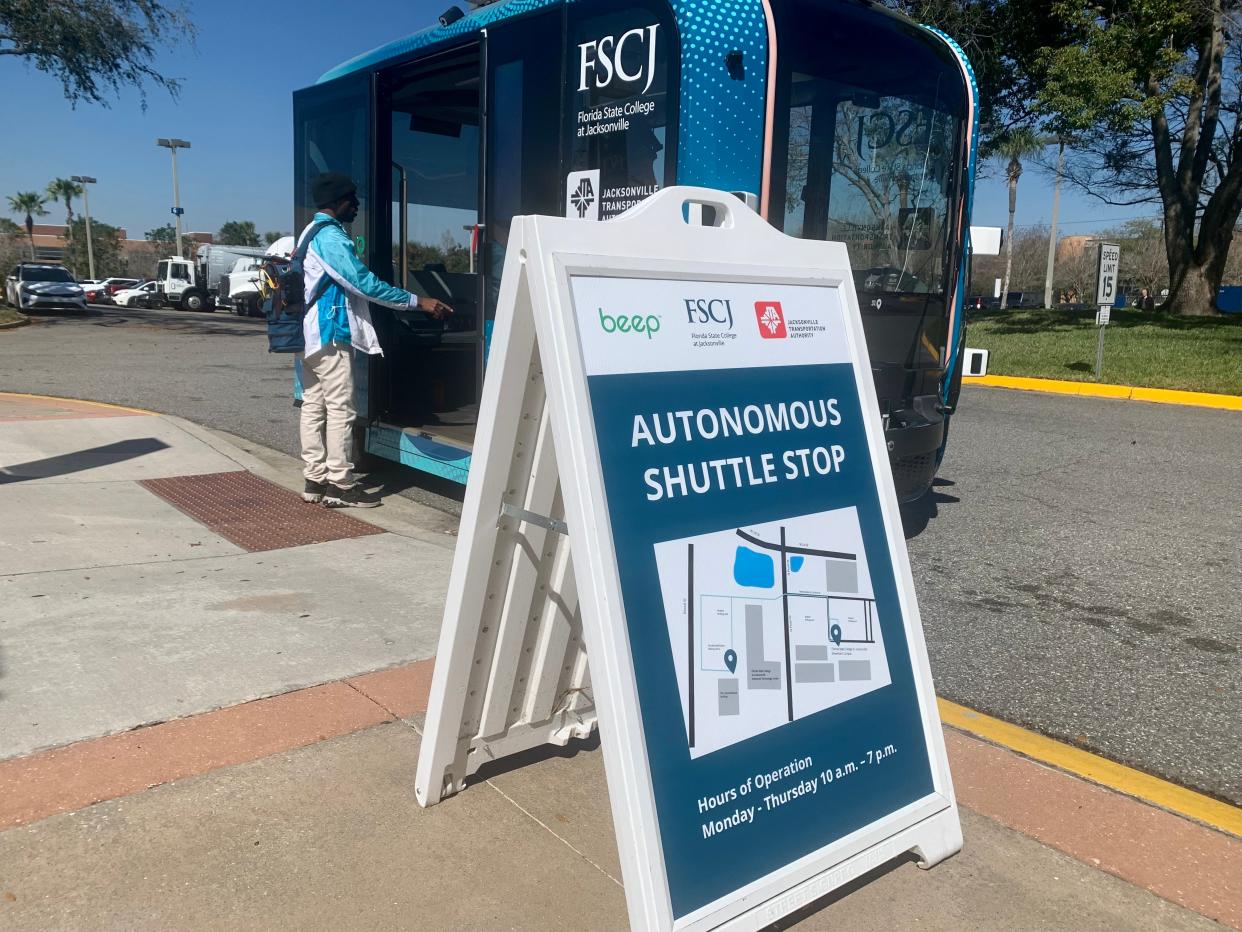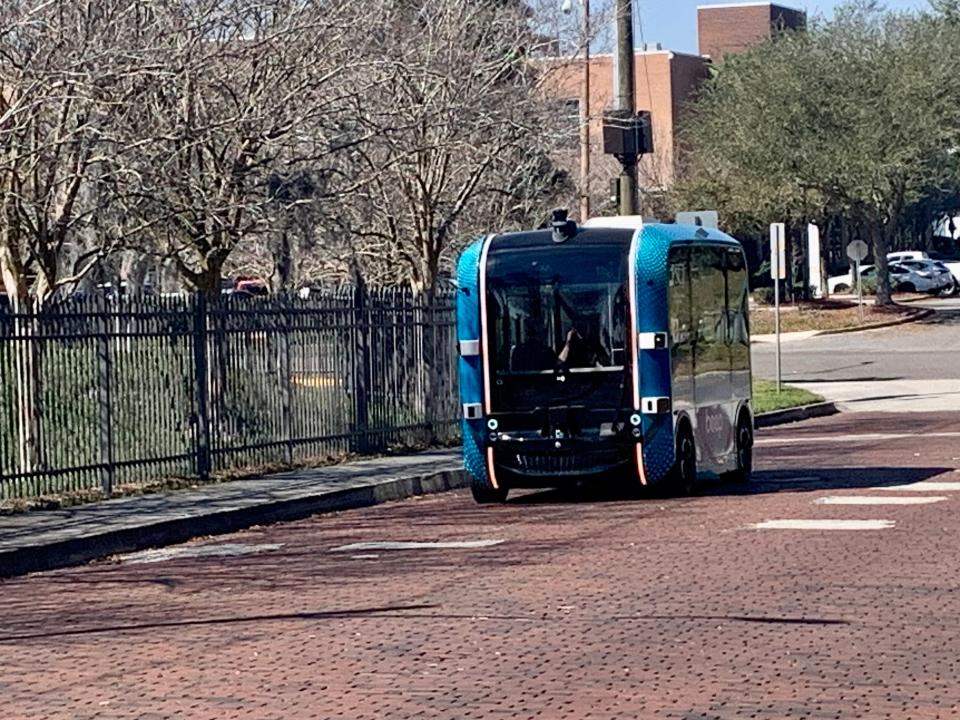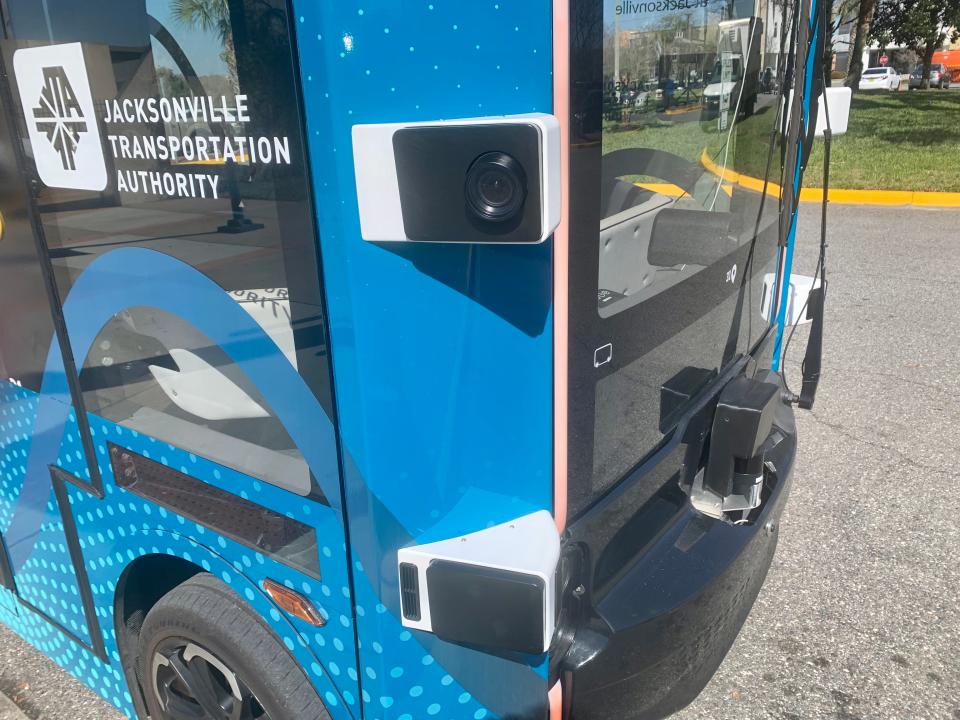Automated vehicles 101: FSCJ uses downtown campus as route for sensor-guided shuttle

Florida State College at Jacksonville students will give their own report card in the summer on what it's like to ride an autonomous vehicle billed as the first shuttle of its kind on a Florida college campus.
The five-month pilot project started last month and is the latest roll-out of automated vehicle technology by the Jacksonville Transportation Authority as it talks with global companies about expanding into the U.S. for the manufacturer of such vehicles.
"Yes, it's bold and it's filled with unique challenges, but there's so much potential as we seek to make Jacksonville a hub for the autonomous vehicle industry," JTA board Chairwoman Debbie Buckland said of using the technology for transit.
JTA moves closer to start of work on system of self-driving transit shuttles in downtown
A $6.5 million contract will begin design of converting Skyway structure in downtown
Ferry trips across St. Johns River will return Tuesday after three-week pause
The shuttle will run on FSCJ's downtown campus in a partnership between the the college, JTA and Beep, the company that operates the vehicle.
Here's how the shuttle will operate, who can ride it, and what JTA and FSCJ want to learn from the new approach to moving passengers on the campus.
Is this the same shuttle JTA will use on Bay Street in 2025?
No. JTA plans to launch an autonomous vehicle service on Bay Street in 2025 and is looking at vehicles that would be larger and "purpose built" for a route that would run from the heart of downtown's Northbank out to the sports complex.
The Bay Street Innovation Corridor's vehicles would be similar to what's at FSCJ in that the vehicles would use sensors and cameras to guide them on a pre-determined route without needing a driver to steer them.
One challenge facing JTA is that a $12.5 million federal grant for the Bay Street corridor requires vehicles to comply with "buy American" requirements that at least 70% of the vehicle's components be made and assembled in the United States.
"We do see a path toward that," JTA CEO Nat Ford said. "There are a number of international manufacturers that have been talking to the JTA about setting up shop in the United States to build these vehicles."
How did JTA and FSCJ come together on the new service?
The partnership started in 2020 to expand JTA's "test and learn" program by using FSCJ's Cecil Center Campus on the Westside as a test track followed by developing a curriculum for courses in autonomous vehicles and related technologies.
The third milestone for that partnership is the launch of an autonomous vehicle shuttles on an FSCJ campus.
FSCJ President John Avendano said students are a good fit for trying out the vehicles and getting their feedback. He compared riding in an autonomous vehicle to how young people have embraced smartphones.
"It's the exposure to technology that is in the future," he said. "I think that's why it makes the most sense to be on a college campus. ... They want to learn, they want to experience it just as easily as it would be to pick up the iPhone for the very first time. I think they're going to adapt very well."

How much does the pilot program cost?
JTA is covering the $322,000 cost for the pilot project at the downtown campus where the vehicles operate on a 1 mile loop that mainly takes riders through parking lots on trips across campus. Drivers on North Pearl Street might see the vehicles when they cross that street on their routes.
The service operates on weekdays and does not charge a fare for FSCJ students and employees to hop a ride.
Will FSCJ expand the shuttle to other campuses?
The downtown campus got the pilot project and FSCJ is considering expansion to other campus such as its South Campus on Beach Boulevard and North Campus on Capper Road.
"Ultimately, we would hope to have those campuses connected," Avendano said.
Where else does Beep have shuttles in Florida?
Beep, headquartered in Orlando, says it has deployed autonomous vehicles at 17 locations in six states. Half of those have been in Florida with current operations at FSCJ in Jacksonville, Altamonte Sprigs, Lake Nona, Orlando and Port St. Lucie. Previously, Beep did service at Mayo Clinic in Jacksonville, the Miami Zoo, Pinellas County and Tampa.
The service at Mayo Clinic operated during the COVID-19 pandemic for transporting medical supplies. That service didn't carry passengers.
Beep launched a pilot project last year at University of North Carolina at Charlotte campus that is similar to the FSCJ pilot in catering to college students on a campus.

Are the vehicles truly 'driverless?'
The FSCJ shuttles operate with a human attendant on board who is able to take over when necessary in guiding the vehicle. In autonomous vehicle levels of self-driving vehicles, that is at level 3, or the mid-point of the five levels of automation.
Ford said that when JTA opens the Bay Street Innovation Corridor in 2025, it will also start with safety attendants on the vehicles. He said after the "appropriate period of time and testing," JTA would move to level 4 that is a driverless vehicle when it has a comfort level with making that change. "But that comes with time," Ford said.
This article originally appeared on Florida Times-Union: FSCJ and JTA join Beep in rolling out automated shuttle

